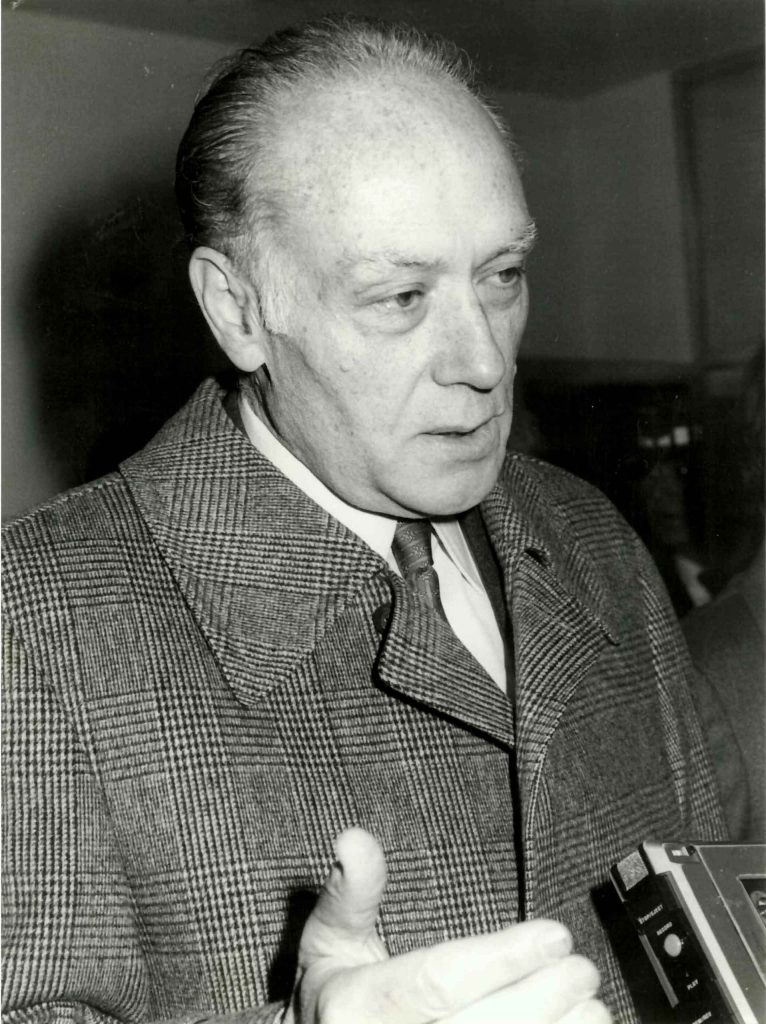HUMANIST
The newspaper Diario Madrid
If he had not been a banker, Luis Valls would undoubtedly have given free rein to his hidden vocation: journalism. He frequently collaborated with the press and had his own adventure in the media.
Acquiring a Newspaper
It was in 1962 that, as journalist Fernando González-Urbaneja1 recalls, Luis Vals had the idea of creating “a centre for discussion along the lines of the Liga de Educación Política, created in 1914 by Ortega and the Unión Catalana de Estudios Políticos Económicos y Sociales, created in the 30s by Cambó and whose president was Fernando Valls Taberner, Luis’ father”. He called it FACES (Promotion of Cultural, Economic, and Social Activities) and he was joined by founders such as Juan Herrera (Edica, Banesto, Esso), Alfredo Jiménez Millas, Joaquín Benjumea (Urquijo), General García Rebull, Javier Vidal (Huarte), García Moncó (former minister, Banco Bilbao), among others. With this objective in mind, FACES acquired an afternoon newspaper that had been running at half steam since 1939 and that, as the obituary published by El Mundo’s Magazine a few weeks after Luis Valls’s death recalls2, “suffered the wrath of Fraga, Minister of Information, and was closed in 1971 by Carrero Blanco.” But what happened? What newspaper was it? Let’s go back to the beginning of the story.
The Reason for Buying a Newspaper
Rafael Bermejo, technical secretary general of Banco Popular during Luis Valls’s time, recalled a year after his death the era he called “The Prodigious Years” (1953 to 1973) in which, while managing the bank, Luis Valls decided to take on his great challenge in the Fourth Estate: “The newspaper without imposing an editorial line, became an important platform for political pluralism, the first in the closed world of Francoism. The Madrid newspaper was a key element of what would later become the political transition (…).” “Influencing rather than commanding” was a phrase Luis Valls liked to use. From the platform of a newspaper, there was much to do and say to awaken a society silenced by the totalitarian regime in which it had lived for almost 25 years. This is how he saw it 1 : “In a time of complete censorship almost twenty years ago, I bought the newspaper from the Pujol family. In order to have the forbidden information, to have a center for political discussion, and to tackle major national issues from a daily newspaper, this was his interest in sharing thee ownership of the independent Madrid afternoon newspaper.” The project only lasted nine years.
The Closure of Diario Madrid
This story marks Luis Valls’s life, not so much because of the enforced closure of the newspaper, but because it led to the loss of a person he considered a friend. In Bermejo’s words, it was a “confrontation with the editor Rafael Calvo Serer who, eager for prominence, believed himself to be the owner, when he was only a fiduciary.” In an interview he gave to journalist Fernando González-Urbaneja1, with whom he had an excellent relationship, Luis Valls opened up about this incident: “The clash was over the ownership, not with the editorial staff. No writer who has passed through Madrid can recall a single anecdote involving interference in their work on my part. I believe no one will be able to say anything in an attemp to disprove me. I only had arguments with the ownership, with the shareholders of one side and the other, because both wanted to take what was not theirs.” In this article Luis Valls tried to make his version clear.
Retiring in Time. Not linke General De Gaulle
This is the title of the article that marked the beginning of the end for Diario Madrid. It was published in 1968, with Antonio Fontán at the helm of a newspaper that had a newsroom full of prestigious journalists: Miguel Ángel Aguilar, José Oneto, José Vicente de Juan, and Alberto Míguez, among others. The piece subtly compared Franco with De Gaulle and called for the dictator to step down, which cost them a two-month suspension. Although, from the beginning, they had wanted to earn a place as part of an independent press, they increasingly became a critical option of the regime.
Meanwhile, Manuel Fraga had been appointed Minister of Information. In charge of censoring any information or editorial content deemed dissident. It seems he took advantage of a business crisis (the confrontation between Calvo Serer and Luis Valls and other shareholders) to close the newspaper. November 25, 1971 saw the last issue of Diario Madrid. Luis Valls always kept a bitter-sweet memory, more from the falling out with someone he considered a friend than from suffering the blow of censorship that still took a few years to extinguish.
Bibliography
(1) Interview by Fernando González-Urbaneja with Luis Valls published in El País (12/05/1976) (2) Excerpt from an obituary article titled “The life they lived,” with a section dedicated to Luis Valls (“The banker who read the Bible every day“), published in the Magazine supplement of El Mundo on Sunday, December 31, 2006.


